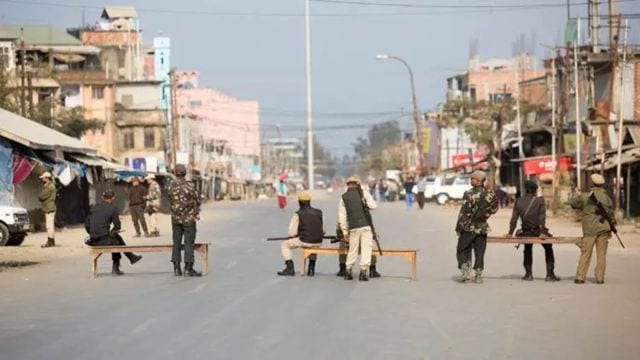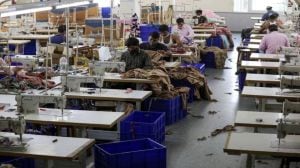Insurgent groups on back foot, Manipur businesses get room to breathe as extortion ebbs
In March, 123 cadres of insurgent groups or individuals reporting to cadres of insurgent groups have been arrested in the state, including for extortion.
 The ethnic conflict in the state, which will complete two years in May, had led to a resurgence in the activities of insurgent groups, which had weakened over the years, and the empowerment of armed group Arambai Tenggol. (File photo)
The ethnic conflict in the state, which will complete two years in May, had led to a resurgence in the activities of insurgent groups, which had weakened over the years, and the empowerment of armed group Arambai Tenggol. (File photo)“Let’s fight extortion together,” declares a large black and yellow banner plastered across Manipur’s Meitei-majority valley. It flashes the number of the anti-extortion helpline set up by the state government on January 26, which has received over 100 calls and counting. The calls don’t tell the whole story – according to senior security officials, since President’s Rule was imposed in the state, there has been a “perceptible decline” in extortion-related activities.
Multiple stakeholders The Indian Express spoke to, from shop owners and trade union leaders to college teachers in the Meitei-majority valley, also said a key change almost two months since N Biren Singh’s resignation as chief minister is a decrease in open and rampant extortion activities.
A senior security official attributed this to several insurgent groups no longer feeling as emboldened. “Various underground groups that came ‘overground’ during the conflict are scattering for now, fearing a crackdown. Last month, a KYKL (Kanglei Yawol Kanna Lup, a proscribed insurgent group) cadre was caught at Agartala airport, from where he wanted to go to Bangladesh. Several such people have been caught and arrested in Kamrup in Assam. We have also received intelligence reports from Bangladesh that groups are establishing bases there.”
According to a senior security official, around 400 people have been arrested in connection with extortion-related charges since the start of the conflict in May 2023. Of these, he said, 140 arrests have been made in the one-and-a-half months of the imposition of President’s Rule in the state, many in response to distress calls made by victims on the helpline. “We can attribute that to a sense of relief, that the impunity of these groups has reduced,” said the official.
In March, 123 cadres of insurgent groups or individuals reporting to cadres of insurgent groups have been arrested in the state, including for extortion.
“The most important thing is that they (the insurgent groups) know they no longer have an umbrella of protection. We have conducted raids in over 80 locations,” said the official.
The ethnic conflict in the state, which will complete two years in May, had led to a resurgence in the activities of insurgent groups, which had weakened over the years, and the empowerment of armed group Arambai Tenggol. Multiple factions of these groups, claiming to work for the protection of the community, had started seeking “donations” from people living in the state’s valley districts.
“A group of four-five boys would come, pass on a phone, and have someone on the line say that they are from such-and-such group. Saying no to their demand for ‘donations’ was not an option. The only conversation that could happen was a negotiation on the amount. This kind of intimidation and shop visits have reduced,” said a non-Manipuri stationery shop owner in the central Thangal Bazar.
Another non-Manipuri shop-owner in Paona Bazar said he had been paying around Rs 15,000 a month to different groups. He said this has reduced, but added that extortion on the highways continues. “The highway collections have always been there, even before the violence, and that is still there for every consignment of goods,” he said.
He was referring to collections made by Naga and Kuki-Zo groups at “checkposts” from trucks on national highways. “These two years have been even worse than the Covid pandemic – there are no sales; the market is down for everyone,” he said.
However, some businesses say that while open threats have ebbed, more subtle means of extortion continue. A business owner in Singjamei showed how demands for money, with a list of names of all shop owners in the area, are still being circulated by some groups on WhatsApp. “We are still giving. I don’t trust going to the police,” he said.
Elaborating on the change on the ground, a senior police official said, “Political interference has decreased, so police officers are able to act. And, trouble-mongers have lost their backing, so they are finding themselves on the backfoot. Fierce fighting in Myanmar’s Sagaing region also means that many cadres have gone to defend their sanctuary there. But no one can say how long this will last since political dialogue still has not happened.”







